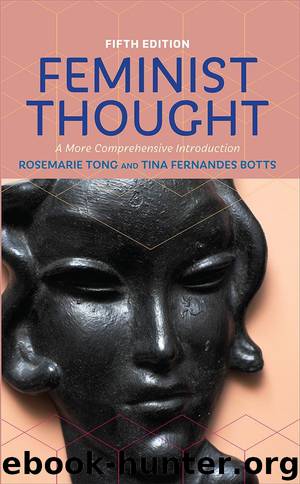Feminist Thought: A More Comprehensive Introduction by Tong Rosemarie

Author:Tong, Rosemarie
Language: eng
Format: epub
Publisher: Taylor and Francis
Published: 2018-05-03T16:00:00+00:00
Critique Two: The Mother-Child Relationship Is a Shaky Basis for Developing a Mature Ethics
The claim that something like the mother-child relationship is an inappropriate paradigm for ethical relationships is the most serious challenge to maternal ethics. Critic Jean Grimshaw argued that at least three factors weaken the paradigmatic strength of the mother-child relationship. First, parents are responsible for their children’s physical and psychological well-being, but children are not responsible for their parents’ physical and psychological well-being—at least minor children have no such filial duty. Second, parents are permitted—indeed sometimes required—to tell their children what to do, but not vice versa except in certain circumstances (think of an elderly parent with advanced Alzheimer’s disease). Third, parents are expected to behave better than their children. Indeed, mom and dad are expected to “tolerate, accept, and try not to be hurt by behavior that would be quite intolerable or a cause for anger in most adult relationships.”66
Given these three asymmetries, modeling adult relationships on the mother-child relationship seems like a prescription for disaster. Precisely the features that tend to make a mother-child relationship work will quite likely damage or destroy a relationship between two adults, in Grimshaw’s and most probably also in Hoagland’s estimation.67 For an adult relationship to work, both parties must be responsible for each other; neither must presume to know the other’s good better than the other knows it; and both must behave equally well, since one adult will not accept from another the small manipulations, name calling, and temper tantrums parents accept from children.
According to Grimshaw, women in particular think maternally for bad as well as good reasons. Some women develop such virtues as care, responsiveness, attentive love, and resilient good humor to create and maintain strong female friendships from which they derive support. Other women develop these same virtues simply to please the men on whom they depend or to cater to their children, on whom they pin their own identities. Rather than looking to unequal mother-child relationships to decide whether their maternal virtues are really virtues, women should compare and contrast their equal and unequal relationships. Women will discover, in Grimshaw’s estimation, that relationships between equals are more fully satisfying than those between unequals.
Download
This site does not store any files on its server. We only index and link to content provided by other sites. Please contact the content providers to delete copyright contents if any and email us, we'll remove relevant links or contents immediately.
The Rules Do Not Apply by Ariel Levy(4957)
On the Front Line with the Women Who Fight Back by Stacey Dooley(4859)
The Lonely City by Olivia Laing(4798)
Bluets by Maggie Nelson(4547)
The Confidence Code by Katty Kay(4251)
Three Women by Lisa Taddeo(3422)
Not a Diet Book by James Smith(3409)
Inferior by Angela Saini(3311)
Confessions of a Video Vixen by Karrine Steffans(3301)
A Woman Makes a Plan by Maye Musk(3247)
Pledged by Alexandra Robbins(3170)
Wild Words from Wild Women by Stephens Autumn(3148)
Nice Girls Don't Get the Corner Office by Lois P. Frankel(3034)
Brave by Rose McGowan(2817)
Women & Power by Mary Beard(2767)
Why I Am Not a Feminist by Jessa Crispin(2747)
The Clitoral Truth: The Secret World at Your Fingertips by Rebecca Chalker(2709)
The Girl in the Spider's Web: A Lisbeth Salander novel, continuing Stieg Larsson's Millennium Series by Lagercrantz David(2709)
I Who Have Never Known Men by Jacqueline Harpman(2625)
